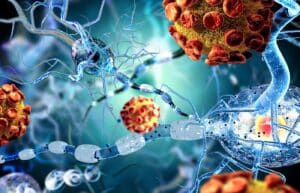Blog
Revolutionizing Autoimmune Disease Treatment: Uncovering the Immunomodulatory Properties of CBD
Autoimmune diseases affect millions of people worldwide, causing the immune system to mistakenly attack healthy cells and tissues. Traditional treatments for autoimmune diseases often focus on suppressing immune activity, but emerging research suggests that CBD (cannabidiol), a non-psychoactive compound derived from cannabis, may offer a novel approach. In this article, we delve into the exciting world of CBD and its immunomodulatory properties, exploring how this natural compound holds the potential to revolutionize autoimmune disease treatment.
Decoding the Immune System and Autoimmunity


The immune system is a sophisticated network of cells, tissues, and signaling molecules that work together to defend the body against harmful pathogens and maintain overall health. To comprehend how CBD can influence autoimmune diseases, it is essential to unravel the complexities of the immune system and the underlying mechanisms of autoimmunity. Within this fascinating realm, we explore the immune system’s delicate balance, where immune cells like T cells, B cells, and macrophages play pivotal roles in distinguishing between self and non-self. We delve into the intricate dance of signaling molecules, such as cytokines and chemokines, which regulate immune responses. When this intricate balance falters, the immune system can mistakenly identify healthy cells and tissues as foreign, leading to autoimmune diseases. Understanding the interplay between immune cells, signaling molecules, and the development of autoimmune diseases provides valuable insight into the potential of CBD as an immunomodulatory agent. CBD’s interactions with the endocannabinoid system and its impact on immune cell function, inflammation, and cytokine production offers hope for restoring immune balance and alleviating the symptoms of autoimmune diseases. By decoding the inner workings of the immune system, we begin to unravel the vast potential of CBD in transforming the landscape of autoimmune disease treatment.
CBD’s Immunomodulatory Effects
CBD’s interaction with the endocannabinoid system (ECS) plays a key role in its immunomodulatory effects. The ECS is a complex network of receptors, endocannabinoids, and enzymes that helps regulate various physiological processes, including immune responses. CBD has been found to interact with both cannabinoid receptors, CB1 and CB2, which are present in immune cells and tissues throughout the body.
One of the significant ways CBD exerts its immunomodulatory effects is through its anti-inflammatory properties. Inflammation is a hallmark of autoimmune diseases, and CBD has shown promise in reducing inflammatory responses. By inhibiting the production of pro-inflammatory molecules and promoting the release of anti-inflammatory molecules, CBD may help mitigate autoimmune-driven inflammation, leading to a reduction in symptoms and potentially slowing down disease progression.
CBD’s impact on immune cell function is a crucial aspect of its immunomodulatory effects. Research suggests that CBD can modulate the activity of immune cells, such as T cells, B cells, and macrophages, involved in the immune response. CBD has been found to promote regulatory T-cell responses, which help maintain immune balance and prevent excessive immune reactions. It may also influence the production of cytokines, signaling molecules that regulate immune responses, potentially restoring immune homeostasis in individuals with autoimmune diseases.
By targeting the ECS and modulating immune responses, CBD holds the potential to restore immune balance, alleviate inflammation, and regulate immune cell function in individuals with autoimmune disorders. However, it’s important to note that more research is needed to fully understand the precise mechanisms by which CBD exerts its immunomodulatory effects and to determine optimal dosages and treatment protocols for specific autoimmune diseases.
Clinical Evidence and Case Studies
In recent years, there has been a growing body of clinical evidence and case studies that shed light on the potential of CBD as an immunomodulatory agent for autoimmune diseases. Researchers have directed their attention towards various conditions, including rheumatoid arthritis, multiple sclerosis, Crohn’s disease, and psoriasis, to explore the effectiveness of CBD in managing symptoms and improving the quality of life for individuals living with autoimmune diseases.
Clinical studies have revealed promising results, indicating that CBD may offer therapeutic benefits in autoimmune disease treatment. For example, in rheumatoid arthritis, CBD has demonstrated anti-inflammatory properties, leading to reduced joint pain and improved physical functioning in some individuals. Similarly, in multiple sclerosis, CBD has shown potential in alleviating symptoms such as muscle spasticity and pain, enhancing mobility and overall well-being.
These clinical studies are complemented by real-life experiences and case studies, which provide valuable insights into the practical application of CBD for autoimmune diseases. Personal accounts from individuals using CBD as part of their treatment journey reveal positive outcomes, including reduced inflammation, pain relief, and a better quality of life. Such stories provide anecdotal evidence that supports the potential of CBD as an immunomodulatory agent.
While the clinical evidence and case studies demonstrate promising results, it is important to note that research in this field is still ongoing, and more studies are needed to fully understand the efficacy and safety of CBD in autoimmune disease treatment. Furthermore, the optimal dosage, administration method, and long-term effects of CBD in managing these complex conditions require further investigation.
Nonetheless, the growing body of clinical evidence and real-life experiences contribute to our understanding of CBD’s potential as an adjunct therapy for autoimmune diseases. By examining specific studies and delving into individual stories, we gain valuable insights into CBD’s therapeutic potential and its impact on the lives of individuals managing autoimmune diseases. Continued research in this area holds promise for further uncovering the benefits and limitations of CBD in autoimmune disease treatment, ultimately offering new possibilities for individuals seeking alternative approaches to manage their conditions.
Navigating CBD as an Adjunct Therapy
As individuals explore the potential of CBD as an adjunct therapy for autoimmune diseases, it is crucial to approach its use with careful consideration. One important factor to keep in mind is the dosage of CBD, as finding the optimal amount can vary depending on factors such as the severity of symptoms, individual response, and the specific autoimmune disease being treated. Working closely with healthcare professionals who are knowledgeable about CBD can provide valuable guidance in determining the appropriate dosage and monitoring its effectiveness.
Product quality and safety are also critical considerations when incorporating CBD into an autoimmune disease treatment plan. It is essential to choose high-quality CBD products from reputable sources to ensure their purity, potency, and adherence to regulatory standards. Third-party lab testing and certifications can assure the product’s quality and safety.
Potential side effects of CBD should be taken into account. While generally well-tolerated, some individuals may experience mild side effects such as fatigue, changes in appetite, or gastrointestinal discomfort. It is important to be aware of these potential effects and to communicate any concerns or observations to healthcare professionals.
It is crucial to consider potential interactions between CBD and other medications being used for autoimmune disease management. CBD can influence the metabolism of certain drugs through its interaction with liver enzymes, which may affect their levels and efficacy in the body. Close monitoring and potential adjustments to medication regimens may be necessary to ensure optimal therapeutic outcomes and minimize any potential adverse effects.
Legal considerations surrounding CBD use should also be addressed. The legality of CBD products can vary across jurisdictions, with some regions having specific regulations and restrictions. Understanding the legal landscape and complying with local regulations is essential to ensure the safe and legal use of CBD as an adjunct therapy for autoimmune diseases.
Consulting healthcare professionals who are knowledgeable about CBD and autoimmune diseases is paramount when incorporating CBD into treatment plans. They can provide guidance, monitor progress, and address any concerns or questions that may arise. Their expertise and oversight can help individuals make informed decisions and tailor their autoimmune disease management strategies to include the potential benefits of CBD.
By navigating these considerations, individuals can maximize the potential of CBD as an adjunct therapy for autoimmune diseases. With careful attention to dosage, product quality and safety, potential side effects, drug interactions, and legal aspects, individuals can harness the potential benefits of CBD while ensuring their overall well-being and optimal treatment outcomes. Working in partnership with healthcare professionals, individuals can embark on a personalized and informed journey to leverage the potential of CBD in managing their autoimmune conditions.
Uncovering CBD’s Immunomodulatory Potential
The immunomodulatory properties of CBD offer an exciting avenue for revolutionizing autoimmune disease treatment. By understanding the intricate workings of the immune system and the potential of CBD to modulate immune responses, we unlock new possibilities for managing symptoms and improving the quality of life for individuals with autoimmune diseases. As research progresses and more evidence emerges, CBD’s role in autoimmune disease treatment may continue to expand, paving the way for innovative and personalized approaches to tackle these complex conditions.


